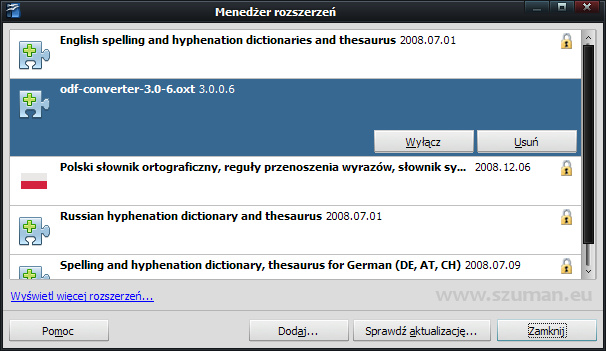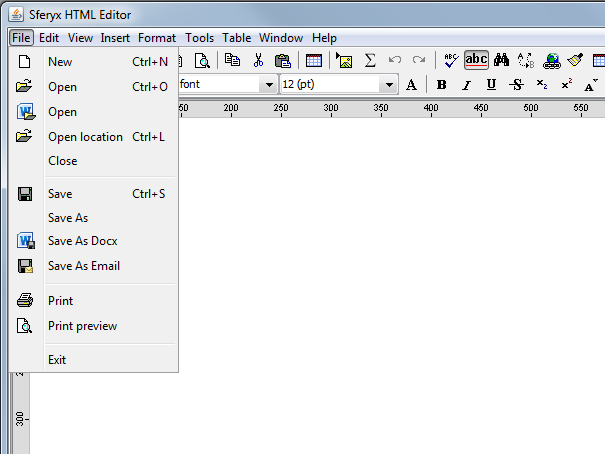

This allows files to be opened even if a component within the file (for example, a chart or table) is damaged or corrupted. Improved damaged-file recovery Files are structured in a modular fashion that keeps different data components in the file separate from each other.
#Save openoffice documents as .docx by default install
You do not have to install any special zip utilities to open and close files in Office. When you save a file, it is automatically zipped again. When you open a file, it is automatically unzipped. The Open XML Format uses zip compression technology to store documents, offering potential cost savings as it reduces the disk space required to store files and decreases the bandwidth needed to send files via e-mail, over networks, and across the Internet. The Open XML Formats include many benefits - not only for developers and the solutions that they build, but also for individual people and organizations of all sizes:Ĭompact files Files are automatically compressed and can be up to 75 percent smaller in some cases. What are the benefits of Open XML Formats?Ĭan different versions of Office share the same files? What are the benefits of Open XML Formats? This article discusses key benefits of the format, describes the file name extensions and discusses how you can share Office files with people who are using earlier versions of Office. These formats and file name extensions apply to Microsoft Word, Microsoft Excel, and Microsoft PowerPoint. Media-Type: application/ with the 2007 Microsoft Office system, Microsoft Office uses the XML-based file formats, such as. URL: :$UNO_SHARED_PACKAGES_CACHE/uno_packages/lu12239h81nfm.tmp_/msoff.oxt/writer.xcu URL: :$UNO_SHARED_PACKAGES_CACHE/uno_packages/lu12239h81nfm.tmp_/msoff.oxt/setup.xcu Media-Type: application/-dataĭescription: URL: :$UNO_SHARED_PACKAGES_CACHE/uno_packages/lu12239h81nfm.tmp_/msoff.oxt/jobs.xcu URL: :$UNO_SHARED_PACKAGES_CACHE/uno_packages/lu12239h81nfm.tmp_/msoff.oxt/common.xcu LibreOffice settingsĬan be managed with a shared extension installed by the sysadmin that overrides Media-Type: application/-bundleĪ common sysadmin task is to provide good defaults. URL: :$UNO_SHARED_PACKAGES_CACHE/uno_packages/lu12239h81nfm.tmp_/msoff.oxt While adding the extension it throws an error as listed above Sudo unopkg add -shared Sample_LO_configuration_extension.oxtĮRROR: (.IllegalArgumentException) When i execute this command, it throws below error Hopefully, that will give you some ideas. DOC file and choose an application from a list.Īpplication/rtf= Īpplication/x-designer= Īpplication/x-wine-extension-ini= Īpplication/rtf= There is probably a GUI way to do it in Ubuntu. I run Kubuntu, so I assume Ubuntu is similar. xcdīut best, note the Configuration Extension approach mentioned at the end of that deployment section, which if installed as a shared extension would be the preferred way to make such pre-sets available to everyone.

For die-hards there’s also the possibility to place a share/registry/data/somename.xcu file with a relevant configuration snippet, which are read after. That doesn’t help against conflicting settings in different. See Deployment and Migration, Post deployment configuration. xcd file aside in the share/registry directory. However, modifying the installation’s main.xcd isn’t a good idea either, it will get overwritten on updates, rather place an additional. Generally not recommended though, it’s better to always save in native ODF formats and only when needed convert to / export as alien MS formats. Diffing the registrymodifications.xcu before and after may give you an idea of the configuration nodes and content. For one user: menu Tools → Options → Load/Save → General, make your choices for Document type and Always save as.


 0 kommentar(er)
0 kommentar(er)
